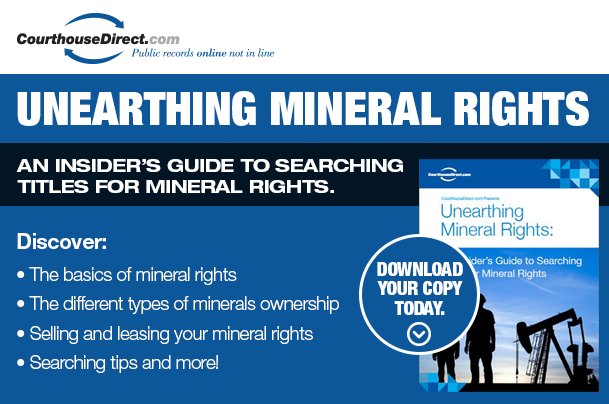 Owning land with valuable natural resources beneath the surface comes with the opportunity for an income stream from leasing or selling the mineral rights. The Boston Tea Party notwithstanding, federal taxes on income of any kind has become as American as apple pie. So, the short answer to the title question is yes, there is a federal tax on the income from leasing or selling mineral rights.
Owning land with valuable natural resources beneath the surface comes with the opportunity for an income stream from leasing or selling the mineral rights. The Boston Tea Party notwithstanding, federal taxes on income of any kind has become as American as apple pie. So, the short answer to the title question is yes, there is a federal tax on the income from leasing or selling mineral rights.
We address the long answer in this post, where you can read about some of the complexities of your tax situation and some tips for filing. We’ll also look into a couple of potential trouble spots and provide some guidance for avoiding them.
When taxpayers (owners) of mineral-rich land arranges for the development of those resources using a lease arrangement, they create a complex financial situation. They must account for royalties, bonuses, and other income received in exchange for access to those resources. If the rights are sold, the taxpayers must pay sales tax on the amount received in compensation.
Either way, Uncle Sam gets his share. It's up to you to navigate the changing sea of tax laws to avoid penalties. Let's take a look at the workings of a lease agreement.
Lease Agreements and Lease Bonuses
In a lease agreement, the owner allows the extraction of oil and gas (or other valuable minerals) in exchange for payment.
- Delay rental is a payment to extend an existing lease at the request of a lessee. In situations where the lease is set to expire, and the lessee has developed the resourced fully, the lessee requests an extension, which must then be included with the cost of any lease bonus. The lessee expects to recover the costs through depletion.
- Royalties are periodic payments for the taxpayer’s share of the natural resources from production. Often, the taxpayer retains a percentage share during the lease in hopes of receiving royalties once production begins.
- A lease bonus is a cash payment the lessee pays in exchange for the lease agreement, providing some added incentive to the owner to lease the mineral rights. The bonus can be paid as a lump sum or in multi-year payments.
You pay taxes according to your working interest in extraction operations. The lessee provides you with Form 1099-MISC and lists the bonus payments as RENTS in Box 1.
- If you have no working interest in extraction operations, your lease and bonus are reported as income on Part 1 of Schedule E - Form 1040, Supplemental Income and Loss.
- If you have a working interest in extraction operations, you are subject to Self-Employment tax and must file Schedule C - Form 1040, Profit or Loss from Business.
If the lessee’s mineral extraction operation begins producing, you may be paid royalties according to the terms of the lease.
Royalties
Royalties are income from the lease of mineral rights that the IRS considers ordinary income. As with all income tax, it must be reported on an annual basis. The taxes owed are based on your overall income tax bracket.
- If you earn more than one-third of your income from leases and royalty payments for mineral rights, you must pay quarterly estimated taxes to avoid underpayment penalties at tax time.
- If you earn more income from your primary work or business and you earn less than one-third of your income from leases and royalty payments, you do not need to pay quarterly taxes.
The lessee provides you with Form 1099-MISC and reports royalty payments as Royalties in Box 2. You report the royalty payments as royalty income on Schedule E.
You can reduce your tax obligation by claiming certain expenses resulting from your ownership of the mineral rights, such as legal fees and phone calls. You can also reduce the tax burden by calculating depletion.
Depletion
Depletion refers to the amount of mineral reserves used up through the extraction process. Over time, less oil or gas is available to extract, reducing your taxes. Depletion is calculated based on either cost or a percentage. Ask an accountant or tax lawyer experienced in oil and gas taxation to determine the best method for your circumstances.
Depletion can allow you to deduct up to 15% of your income from royalties and leases. However, the deduction is only available for owners who purchased the land specifically for mining purposes, not property owners who chose to lease their mineral rights later for additional income.
To calculate depletion, divide the cost of your investment (the initial purchase of the land with mineral rights) by the estimated value of the minerals to be recovered. If you are a high volume landowner who buys and sells property frequently, you may be able to take advantage of a deferment program offered by the federal government.
If the purchase and sale occur within a 45-day window, you may be able to dispose of the land tax-free. You replace one investment with another instead of cashing in on a traditional sale. See Internal Revenue Code (IRC) Section 1031 for more information.
Sales Income
If you sell the mineral rights instead of leasing them, your income from the sale must be reported as a specific type of property tax. The sale of mineral rights is considered the equivalent of a sale of real property that has been used for business or trade purposes as outlined in IRC Section 1231.
Depending on the structure of the organization used to purchase the parcel and your intention to use it as an investment, the income from the sale may be classified as capital gain and taxed accordingly.
Special Considerations
There are a few situations where the lease or sale of mineral rights could generate additional tax consequences.
- Estate Planning - consider gifting your income from mineral rights leases and royalties to your children or grandchildren. The gift becomes a tax deduction that can reduce your federal and state tax obligations as you grow older.
- Multiple Oil and Gas Lease Contracts - If you own more than one property for which you lease the mineral rights and receive royalties, consider incorporating your leasing operations as an S-corporation or Limited Liability Company. Both types of business entities provide personal liability protection and tax breaks.
- Selling Mineral Rights - When you sell your mineral rights, you may increase the probability of a tax audit. Taxpayers filing Schedules C, D, and E tend to be flagged for further review more often than other taxpayers. If you report a significant income stream from ongoing royalty payments, you are at increased risk of audit.
To protect yourself in all tax situations, collect and store any and all documents from the lease, sale, and royalty payments in a safe place in case the IRS comes to call.
A second income stream from mineral rights leases or sales is always welcome. Just remember that the taxman always cometh. Stay on top of your taxes and employ or consult a tax attorney or preparer with experience in oil and gas mineral rights.























